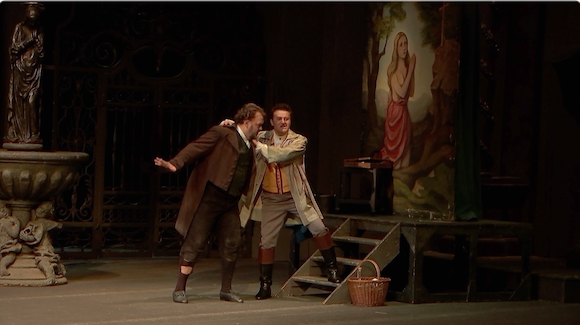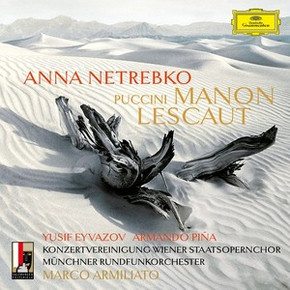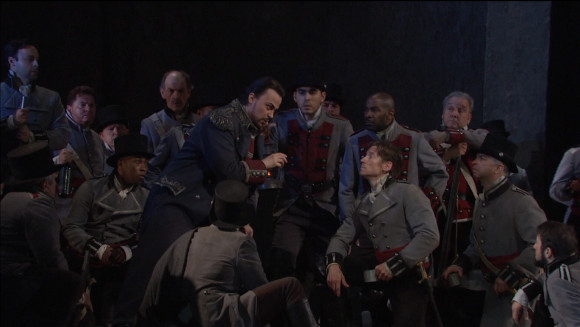Puccini’s La Rondine has a plot that’s lightweight even by opera standards but it also has some really good tunes and plenty of opportunities for a star tenor and soprano to show off. In 2009 the Metropolitan Opera presented it as a vehicle for on again, off again couple Roberto Alagna and Angela Gheorghiu. Judging by the body language on and off stage this was definitely an “on again” phase. The production (Nicolas Joël), staging (Stephen Barlow) and design (Ezio Frigerio) don’t have a single thing in them that would cause concern to the most conservative of opera goers. The whole thing oozes old fashioned opulence. It’s the first time I’ve heard an audience applaud the sets! (Baldrick, you’ld laugh at a Shakespeare comedy). So no Regie here!
 What we get is a beautifully sung and played performance. Gheorghiu sings gorgeously throughout and Alagna is not far behind. Their acting hows off some real sexual chemistry and if Gheorghiu tends to play the dive, well it’s that sort of role and that sort of production. They get well supported by Marius Brenciu, as the poet Prunier, and Lisette Oropesa, as the maid Lisette. These two basically provide the comic relief to the slightly cloying romantic main plot. Monica Yunus, Alyson Cambridge, Liz DeShong and Samuel Ramey take the other important roles and all are perfectly competent and true to character. The only aspect of the staging that doesn’t quite come off is the bar scene in Act 2. It’s all a bit too busy and there is some not very well thought through “drunk” choreography. Otherwise it’s basically a drawing room drama so not too, too hard to pull off. The orchestral playing is unsurprisingly good with the kind of music the Met orchestra excels in and Marco Armiliato conducting.
What we get is a beautifully sung and played performance. Gheorghiu sings gorgeously throughout and Alagna is not far behind. Their acting hows off some real sexual chemistry and if Gheorghiu tends to play the dive, well it’s that sort of role and that sort of production. They get well supported by Marius Brenciu, as the poet Prunier, and Lisette Oropesa, as the maid Lisette. These two basically provide the comic relief to the slightly cloying romantic main plot. Monica Yunus, Alyson Cambridge, Liz DeShong and Samuel Ramey take the other important roles and all are perfectly competent and true to character. The only aspect of the staging that doesn’t quite come off is the bar scene in Act 2. It’s all a bit too busy and there is some not very well thought through “drunk” choreography. Otherwise it’s basically a drawing room drama so not too, too hard to pull off. The orchestral playing is unsurprisingly good with the kind of music the Met orchestra excels in and Marco Armiliato conducting.
 The video direction by Brian Large is OK. Given how much of the piece is two people talking, snogging or groping close ups seem a perfectly reasonable choice much of the time. The approach doesn’t work so well in Act 2 where a little more distance would have helped. Technically the DVD is an absolutely standard EMI treatment of a MetHD broadcast. The picture is very good 16:9 and the DTS 5.1 soundtrack is clear and spacious (LPCM stereo available too). English, French, German, Spanish and Italian subtitles and rather basic documentation in English with French and German PDF versions on the disk. Renée Fleming does the interval interviews which are about as revealing as usual (not at all).
The video direction by Brian Large is OK. Given how much of the piece is two people talking, snogging or groping close ups seem a perfectly reasonable choice much of the time. The approach doesn’t work so well in Act 2 where a little more distance would have helped. Technically the DVD is an absolutely standard EMI treatment of a MetHD broadcast. The picture is very good 16:9 and the DTS 5.1 soundtrack is clear and spacious (LPCM stereo available too). English, French, German, Spanish and Italian subtitles and rather basic documentation in English with French and German PDF versions on the disk. Renée Fleming does the interval interviews which are about as revealing as usual (not at all).
 All in all, it’s a lightweight piece but enjoyable and it would be hard to imagine a much better performance.
All in all, it’s a lightweight piece but enjoyable and it would be hard to imagine a much better performance.



 Not too many CDs of new opera recordings, at least of mainstream repertoire, come my way these days. Studio recordings have become rare and the usual medium is a video recording, itself a spin off from a live broadcast; TV, cinema or web, of a live performance. This makes sense to me. Just listening to an opera has always seemed a second best. Anyway, that’s all by way of saying that I was a bit surprised to find myself listening to a CD edition of a live recording of Puccini’s Manon Lescaut from the 2016 Salzburg Festival. How did this recording happen you ask? The answer is on the box, where Anna Netrebko in the title role, gets top billing, even over the composer.
Not too many CDs of new opera recordings, at least of mainstream repertoire, come my way these days. Studio recordings have become rare and the usual medium is a video recording, itself a spin off from a live broadcast; TV, cinema or web, of a live performance. This makes sense to me. Just listening to an opera has always seemed a second best. Anyway, that’s all by way of saying that I was a bit surprised to find myself listening to a CD edition of a live recording of Puccini’s Manon Lescaut from the 2016 Salzburg Festival. How did this recording happen you ask? The answer is on the box, where Anna Netrebko in the title role, gets top billing, even over the composer.


